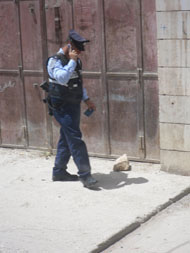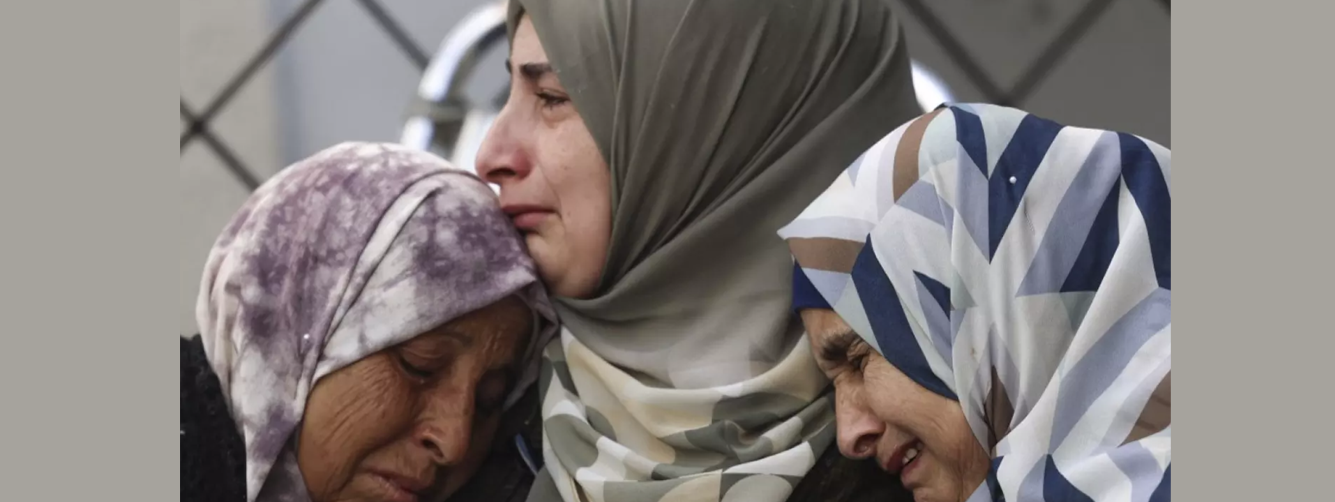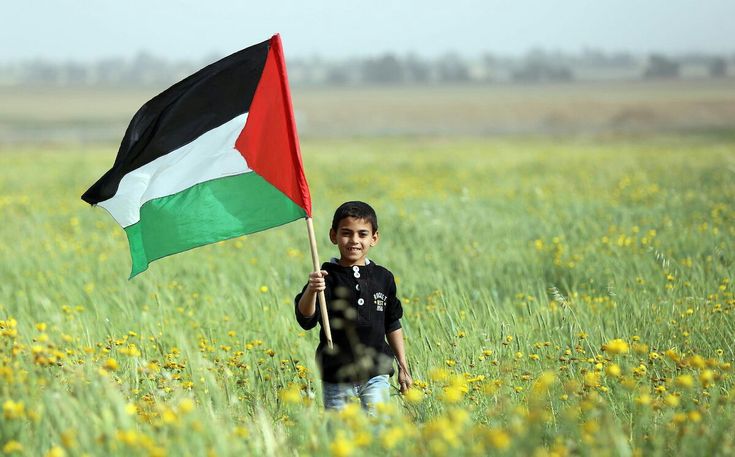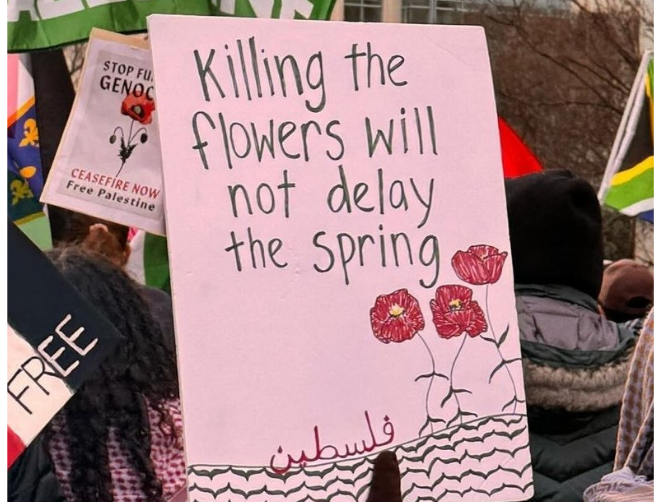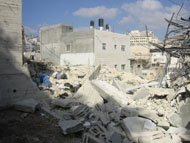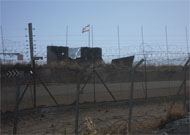Hebron, the southernmost city of the West Bank and settler stronghold, continually and for obvious reasons, falls into an abyss of neglect. In 1997, The Hebron Protocol divided the city into two fractions: H1 and H2. While H1 constituting nearly 80% of Hebron remained under PA control, Israeli military forces assumed responsibility for the internal security and public safety of H2 inhabitants, including that of both Palestinians and Israeli settlers—or at least this was their mandate. Instead, discriminate applications of the law and continuous whitewashing of settler violence is an almost daily occurrence. On a trip to the Abdel Karim Al Jabari home in H2, I became but another witness to the injustices inflicted on local Palestinians, wrongs often excluded from news headlines.
At 10:53am, our tour bus parks parallel to the Al Jabari home isolated from its sheep and goat pen, olive trees, and land by concrete walls, fences, and barbed wire reaching a minimal of 12 feet in height. Here we encounter a local political activist who introduces us to Mr. Al Jabari’s daughter and offers us a tour of the land whose mere landscape tells a callous tale of razing, seizing, and trespassing by ideological Israeli settlers living just up the hill in the Givat Ha’avot Jewish settlement. Not even 10 minutes afterwards, an Israeli military jeep enters the family’s land and just stands, observing the internationals’ every move like a hawk awaiting provocation. Taking the military’s arrival, and then that of the police, as a clear signal of our unwanted presence, the coordinators quickly hurry us onto the bus as the officers watch on, ensuring them that our Palestinian “friend” did not board the bus or travel by settler-only roads prohibited to Palestinians.
Just when I thought we had evaded the watchdogs, at exactly 11:09am, an Israeli police officer pulls the bus over. According to the policeman, by contacting a political activist, we were engaging in a “political act.” While Yoav, our coordinator and an Israeli-Jew, attempts to ease the officer’s suspicions by assuring him that our visit to Hebron was serving a purely educational purpose, the officer remarks that prior to the entry of such a large group into H2 territory, authorization from Israeli forces should have been sought. Just then, a tour bus carrying 40-plus tourists and two Israeli soldiers passes us by. The picture suddenly becomes clear: in their efforts to repress and censor information accessible to internationals, armed soldiers escort foreign travelers into areas plagued by settler violence.
Agitated, waiting impatiently in a bus filled with silence, curiosity, and frustration, I look on as the officer spends nearly 45 minutes on both his mobile and handheld transceiver discussing the “situation at hand” with his superiors. Meanwhile, a combination of at least 20 military and police trucks, jeeps, and cars turn down our street. As I ponder their purpose, I notice a Palestinian mother with her children watching the spectacle from her second floor apartment window. I look up, smile, and wave. Perhaps it was my covert picture-taking of the police or my constant shrugging that revealed my distress, but soon enough, I see this woman whom I had never met trying to comfort me, making hand gestures indicating that it will take a little while, but ultimately, they will let us go. “Istannee,” she says to me in Arabic. “Just wait.”
Now, whenever I walk down a Palestinian street and hear someone utter the three-syllable word, "istannee," all I can think of is the woman at the windowsill. How a family, living under constant fear and military barricades, manages not to lose hope is truly remarkable.
Al Jabari and his 13 children are representative of Palestinians targeted by Hebron's systematic settler violence. Neither he nor his three physically impaired children have been exempt from assault. The family’s situation is quite dire: as one of Al Jabari’s daughters explains, fearing a settler invasion, an adult male is always present. Yet, irrespective of who is there, whether members of the Al Jabari family or internationals, the settlers attack. Habitually after 10pm, the settlers come down from their tactical safe havens throwing stones, sometimes even shooting bullets at the home while chanting, “Kill the Arabs.”
Ideological settlers from Givat Ha’avot routinely intimidate, harass, and target the few Palestinian families wedged between this settlement and Kiryat Arba for standing as obstacles to their linkage and Israeli purification of the H2 area of Hebron. Determined to cleanse H2 of its Palestinian roots, settlers exact a “price” from Palestinians, like the Al Jabari family, who refuse to yield to settler concessions by abandoning or selling their property. Hence, unable to take a direct route to school due to restrictions on Palestinian movement, the Al Jabari children cannot cross their own land without risk of being stoned or attacked, even in the midst of day.
The harassment does not end here, however. From erecting a tent serving as a synagogue on their property, to preventing them from harvesting their olive trees, to stealing their goats, the settlers deliberately strangulate the family's livelihood, attempting to drive the Al Jabaris off their own land.
Despite the upward trend in settler violence reported by the UN Office for the Coordination of Humanitarian Affairs, OCHA, in which 31% of total recorded settler-related incidents in the West Bank targeting Palestinians and their property in the first ten months of 2008 occurred in the H2 area of Hebron, Israeli soldiers barely intervene on behalf of Palestinians. Instead, complaints are often made in vain followed by deficient investigations, more often than not, granting the settlers impunity. While the soldiers protect their fellow citizens, leaving Palestinians at the mercy of settler lawlessness, with video cameras provided by human rights organizations, such as B’Tselem, the Al Jabari family and others alike have been able to document the injustices sustained—as a local political activist tells me, “The camera is our gun.”
Although international humanitarian law defends Palestinians’ rights, the Israeli government incessantly breaches the safeguards guaranteed to its occupied people under the Hague Convention of 1907 and Fourth Geneva Convention on the Protection of Civilian Persons in Time of War, including protections from forced displacement, transfers of population, and property acquisition. Hebron, a ghost-town-in-waiting in which rows of shops once adorned by keffiyehs, needlework, and Palestinian souvenirs in the Old Souq, or market, have been replaced by tightly shut green metal doors, illustrates the economic strangulation accompanying Israeli-Jewish settlements in the center of what once was a vibrant, robust city. And yet, Israeli Prime Minister Netanyahu speaks of “natural growth,” not expansion of West Bank settlements.
Defying United Nations Security Council Resolution 465 calling on Israel to “dismantle the existing settlements” in flagrant breach of international humanitarian law, Prime Minister Netanyahu conveys an unnerving disregard for the international consensus on the illegality of settlement development in the occupied Palestinian territories. Hence, to no surprise, a quick glance at a comparative map of the West Bank finds the two synonymous—natural growth and expansion.
Rather than halting settlement expansion in accordance with international demands, the Israeli government is pursuing an expansionist policy reminiscent of the United States’ Indian Removal Act of 1830 clearing lands east of the Mississippi River of Native Americans for the purpose of establishing American settlements. Similarly, the Israeli government incentivizes settlement growth in the West Bank through subsidies and other monetary inducements. As one Temporary International Presence in Hebron observer notes, “The settlers are stealing inch by inch the land of the Palestinians.” Unless the international community reigns in the occupation, continued expansion is sure to obliterate not only the viability of a two-state solution but predetermine Palestinians’ fate. Is a Trail of Tears next?
Jennifer Urgilez is a Writer for the Media and Information Program at the Palestinian Initiative for the Promotion of Global Dialogue and Democracy (MIFTAH). She can be contacted at mip@miftah.org.




